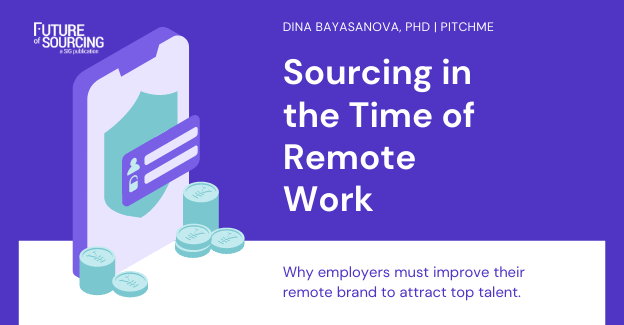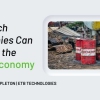Sourcing in the Time of Remote Work
Although major world cities such as NYC and London have begun moving forward with plans to bring employees back to the office, it is an undeniable fact that the pandemic has changed how we work forever. Like it or not, remote work is here to stay in some form – most likely in the form of hybrid working, where a portion of one’s working hours are spent in the employer’s office and a portion remote.
Off the back of this, a clear trend is emerging wherein employees are crying out for remote working to become a permanent fixture of employment. We are seeing that even as pandemic restrictions are loosening, pandemic-era measures have shifted attitudes toward work itself. Remote working is a popular initiative that many people wish to maintain. In fact, a recent survey found that 58% of respondents report wanting to remain as full-time remote employees post-pandemic, while 39% want a hybrid work environment. The bottom line is that after having experienced the benefits of remote working, many employees do not wish to return to the office in a traditional sense.
For employers, this means that the talent marketplace has changed. With more candidates seeking remote or hybrid jobs than ever before, the competition for top talent is fierce. Employers who wish to hire the best people will need to offer a remote option, or risk losing out on bagging the best hires to competitors who can offer a remote working option. In this way, the remote revolution changes not only how we work, but how employers and recruiters source talent and how companies must position themselves in the marketplace.
Market-Leading Companies Offer Remote Options
As attitudes toward work evolve amid the current conditions, there has been an employee pushback to fully in-person work, with candidates increasingly applying to work with companies that offer remote working. This trend also reveals that employers who offer a remote working option are becoming more popular with jobseekers. This is compounded by a record number of employees quitting their job in dissatisfaction over working conditions. These facts, when taken together in one big picture, make it clear that there is a revolution afoot related to the future of work. More specifically, the shifts we are seeing have to do with the changing norms around what it means to work, and how and where that work should be carried out.
For employers, these are important trends to pay attention to. The fact that jobseekers are becoming bolder about their needs and wants when it comes to remote working demonstrates the importance of incorporating remote working into the future of work by normalizing it and offering it as a benefit at the hiring stage.
This also means that companies looking to recruit talent must have a remote-working option to stay competitive in the talent market. Market-leading companies like PWC are already doing this, announcing a hybrid working model available to their employees. With the current conditions favoring jobseekers, those organizations that wish to recruit top talent must rethink how they imagine the practicalities of the future of work – and that means offering a remote option.
Update the Employer Brand to Improve Sourcing
A key part of being in an attractive position to candidates is through having a strong employer brand at the hiring stage. Leading large organizations, such as Google and Spotify, are successful in this regard, because over time they have aligned themselves with attractive employee perks, such as on-site childcare, laundry services and free cafeteria food. These are not the only reasons that such companies attract top talent, but it certainly does contribute to their success in sourcing talent.
In the current social and economic situation, remote working will likewise need to become a core part of the employee package for top talent to continue to vie for roles. “Companies that can successfully update their brands to align with the future of work by offering remote working solutions will see stronger candidate pools than those who do not,” comments Product & Marketing Strategist Kate Moskalenko. “This is because sourcing relies heavily on an employer’s brand and reputation. In the current climate, the forward-thinking companies that leverage the power of remote working will inevitably see more success in their hiring initiatives.”
The World Economic Forum has already established that remote working – in the form of hybrid working – is here to stay. Offering flexible working options, therefore, is no longer a nice-to-have but rather becoming a necessity of the modern workplace. At the HR level, putting corporate promise behind remote working demonstrates to prospective candidates that the company is on board with the future of work and understanding of modern forms of productivity and how to best achieve them.
Remote Working Brings About a New Model of Future Sourcing
Because of these trends and shifts toward remote working, companies can respond by revamping how they source talent. The new, more successful model of sourcing talent will be less of a top-down model, and will likely look more collaborative, driven by the employee’s needs to work from anywhere.
Companies with their eye on top talent will do well to remember the positive impact remote working has on productivity. No longer something to be feared because it occurs outside of the four walls of the company office, remote working provides a new way for companies to increase productivity while delivering a tangible work-life benefit to their employees. Just in the way the free lunch and the subsidized gym pass have changed the benefits structure during the sourcing process, we will likewise start to see remote working as having a huge impact on the companies who lead in sourcing success.
As we move into 2022 and beyond, the companies that update their sourcing processes with remote working at the heart of each job advertisement are those which will be better placed to compete for talent in the modern marketplace. The companies that take the time to reimagine their own brand in the context of remote work, aligning it with a more remote-friendly option, will start to see increased success in the sourcing process, attracting some of today’s top talent. The future of work has arrived – and it is led by remote working. A sourcing process that aligns with this will be poised to benefit from a modern candidate pool of top talent from the outset.









